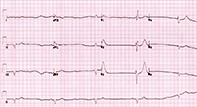Peer Reviewed
ECG education
Is this heart block?
Abstract
Graham, aged 66 years, has mild hypertension but is otherwise well. He tries to keep fit, watches his weight and diet and ceased smoking 25 years ago. He takes felodipine 10 mg/day. Today he comes to see you because he fainted without any warning when he was sitting on the bed after having his morning shower – he has not fainted since age 20 years. He spontaneously regained consciousness, having slid to the floor, and thinks he was unconscious for several minutes.
Key Points
- An ECG should be obtained in all patients with recurrent fainting and in those who have atypical circumstances or an unsure diagnosis and cause of fainting.
- Usually the heart rate in patients with complete heart block varies from 15 to 60 beats per minute.
- The heart rate does not increase much with exercise in patients with complete heart block.
- Patients with acquired complete heart block should always be treated with a permanent pacemaker, unless there is a rapidly reversible cause.
- Treatment of sick sinus syndrome in patients with bradycardias is usually with a dual-chamber pacemaker; any tachyarrhythmias may then be medically managed without worsening the bradycardias.
Purchase the PDF version of this article
Already a subscriber? Login here.

